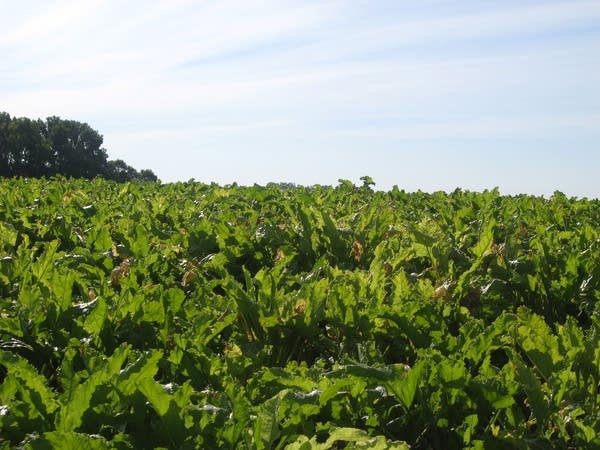Genetically modified sugar beet ban threatens Red River Valley farmers
Go Deeper.
Create an account or log in to save stories.
Like this?
Thanks for liking this story! We have added it to a list of your favorite stories.

When American Crystal Sugar beet growers gathered in Fargo Thursday for their annual meeting, they celebrated one of the best years in the company's history and the third record-breaking crop in five years.
But the celebration of this year's success is overshadowed by anxiety about a legal dispute. A court challenge of genetically modified sugar beets could leave farmers without seeds to plant next year.
Bobby Brandt, who farms with his dad near Ada, said he and most of the sugar beet farmers he knows are nervous, even scared about next year.
"You talk to every grower out there and everybody is like, 'what do we do?' We're all waiting and waiting," Brandt said. "We all want to know, but there's no answers. This is a real upset as a grower being pulled back."
Turn Up Your Support
MPR News helps you turn down the noise and build shared understanding. Turn up your support for this public resource and keep trusted journalism accessible to all.
Brandt said he thought he had received the next level of technology with herbicide resistant sugar beets, on which farmers can use a broad spectrum herbicide to kill all weeds without harming beet plants. Without them, he said, farmers could be forced to go back to conventional seed varieties and chemicals he hoped to never use again.
"[With] our conventional varieties we were making four or five trips across these fields with chemicals, possibly up to six different chemical combinations," Brandt said. "With Roundup it was one nice clean shot, less environmental impact and better weed control for everybody involved."
This year an estimated 95 percent of sugar beets in the Red River Valley were the herbicide resistant or Roundup Ready variety.
But those seeds, produced by Monsanto, are tied up in court battle that could still be going on next spring when farmers are ready to plant.
CONCERNS OVER CROSS-POLLINATION
The case revolves around concerns that genetically modified beets could cross-pollinate and spread their genes to organic beet varieties and other related crops.
A federal judge has ruled the Roundup Ready seeds are illegal until U.S. Department of Agriculture does a proper environmental review. This week the same judge ordered Monsanto to uproot genetically modified plants grown to produce seed.
This year an estimated 95 percent of sugar beets in the Red River Valley were the herbicide resistant or Roundup Ready variety.
American Crystal Sugar President David Berg said he's telling farmers there are few options right now.
"They only thing I know for certain is that as of today Roundup Ready seed is illegal," Berg said. "So if you're planning to plant Roundup Ready seed that's not a viable choice. You have to find an alternative seed source or just wait."
Farmers could wait in hopes the legal case will be settled in time to grow Roundup Ready beets next year. But most have already been looking for other seed sources and finding a short supply.
The complication is the time it takes to produce sugar beet seeds. The plant is a biennial. That means it doesn't produce seed until it's second year. So there's always a two-year lag in seed production.
When Roundup Ready seeds cornered the market, other seed companies cut way back on production. It will take them two years to catch up again.
Berg said there is also a shortage of the herbicides farmers will need if they have to plant older seeds that aren't genetically modified. He said the company is trying to find all the seed and chemical supplies it can.
"There is a very real concern there is not sufficient seed or chemical to produce a crop," Berg said. "Everyone is basically in a scramble right now to find out what they can about what is there. And whether it's 100 percent of all we need that's a question that I think next spring or summer we'll really know if there's enough out there or not."
Berg said not having enough seed to plant a full crop next year would be catastrophic for an industry with hundreds of millions of dollars invested in sugar processing plants.




